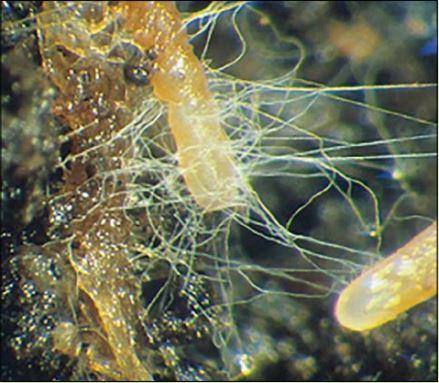Soil microbiology overview

BUILDING THE RIGHT SOIL BIOLOGY FOR GREAT GROW RESULTS
There are several types of soil biologicals, that in the right balance, form a synergistic network with your plant’s root system. A balanced soil biology, sometimes called the soil food web, can reduce nutrient additive needs by up to 50% as they make the nutrients into a form that is available to the plants and increases the plant’s ability to uptake those nutrients.
Bacteria
Bacteria is a major component of the crucial workforce in soils that break down nutrients into bioavailable forms and release them to the root zone for the plant. Bacteria is a key component to building a healthy living soil food web. If you have the wrong balance of bad bacteria then your plants will not be healthy or reach full potential. Getting the right balance can make a huge difference in your plant's health and ability to absorb nutrients.
There are several types of bacteria in the soil including; decomposers, nitrogen fixers, nitrification types, potassium mobilizers, phosphate solubilizers, sulfur oxidizers, disease suppressors, organic acid & hormone & enzyme producers, aerobic and non-aerobic types of bacteria. They each play a key role in soil biology.
Actinomycetes
Actinomycetes are specialized bacteria that break down biomass. Some actinomycetes are beneficial and protect the plant while others are predators and will harm the plant. Many species of Actinomycetes produce antimicrobial compounds to protect the roots.
Fungi
Like bacteria, fungi also live in the rootzone and help make nutrients available to and protect the plants. Fungi are heterotrophs and they benefit by increasing their plant partner’s increased sources of carbohydrates, amino acids, vitamins and other elements which are essential for its growth and development.
Other types of fungi attack pathogenic fungi and protect the roots. Additionally there are other types that fight off nematodes and others to attack specific troublesome insects.
This interaction between plants and fungi creates a symbiotic relationship and is advantageous to both partners.
Protozoa
Protozoa are larger microbes that love to consume and be surrounded by bacteria and help to regulate algae. In fact, nutrients such as Nitrogen are released when protozoa eat the bacteria. This nitrogen then becomes available to the roots.
Nematodes
Nematodes are microscopic worms that live around or inside the plant. Some nematodes are predators while others are beneficial, eating pathogenic nematodes and secreting nutrients to the plant. There are bacterial-feeders, fungal-feeders, root-feeders, omnivore, and predatory types.
Note that there are beneficial and pathogenic strains of each of the above types of soil biologicals. Getting the right balance and a healthy soil food web is key to get your plant to thrive. If your roots are in an unbalanced soil or growth system then you can see issues with slow growth, root rot, plant diseases, high growth of pathogens and insects, or simply poor growth and low yields.
Also in News

Why Healthy Soil is Necessary to Grow Bigger, and Healthier Crops

Investment Opportunity: You Can Now Own Shares of Terra Biotics on StartEngine

